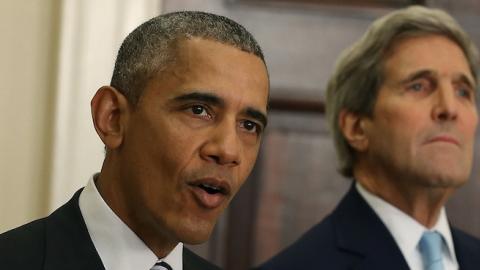Earlier this week, the big breaking news was the release of five Americans that had been held hostage in Iran, just days after I ran a column asking why the administration wasn’t doing more to release them. That led the Village Voice to slam me for not understanding how hostage negotiations really work — and for daring to suggest that President Obama and Secretary of State John Kerry weren’t doing enough to handle the problem.
Then, bit by bit, the truth began to come out. Now we know Obama and Kerry weren’t up to the job, and instead have managed to — once again — make us foolish in the eyes of the Iranians, and everyone else involved.
We’ve learned that in exchange for the release of the five Americans, the administration agreed to drop all charges against seven Iranians accused of helping Tehran dodge sanctions on its military and nuclear-weapons program — the same program Iran isn’t supposed to have anymore.
The administration also included a sweetener in the form for a $1.7 billion settlement on claims relating to the sale of military equipment to Iran before the 1979 revolution — that is, in the days of the hated Shah. That’s in addition to the $100 billion in unfrozen assets Tehran has access to, now that sanctions are lifted — lifted the same day, as it happens, as the prisoners were released.
Even more egregiously, two other American hostages, Robert Levinson and Siamak Namazi, were not released and are still being held. Levinson, in particular, has been missing since 2007. When pressed the mullahs say they can’t release him because they have no idea where he is.
If you believe that, then I have a nuclear deal with Tehran to sell you.
In other words, far from being the result of hard bargaining or a savvy swap, this is another example of Obama quickly folding in a hostage negotiation, whether it’s with Iran or with the Taliban for Bowe Bergdahl. Some have even surmised that this debacle will only put a bullseye on Americans venturing abroad, as easy pickings for hostage taking.
But these criticisms, justified though they are, still don’t get to the real issue, which is Obama’s Iran problem.
The problem is that Obama’s policy of appeasement keeps tripping over the real nature of the Iranian regime. After seven years in office and seven years of fighting to get a deal with Iran, Obama still can’t supply an adequate answer to a simple question: How do you negotiate a nuclear treaty with a country that takes hostages; sponsors terrorism; wages proxy wars on its neighbors; and wants to commit genocide, i.e., wipe Israel off the face of the map?
The answer is, of course, you can’t. Yet Kerry and Obama have insisted on keeping a wall of separation between dealing with Iran as a partner in nuclear talks and dealing with Iran as a vicious regional aggressor — not to mention as a sponsor of Hezbollah, Hamas, and Bashar al-Assad’s war on his own people.
What’s needed instead is a new approach to Iran that tears down that wall of separation. We need a president and administration who are prepared to deal with Tehran based on linkage, i.e., that Iran’s behavior in one sphere will have a direct impact on the United States’s actions in the other, including the lifting or imposition of sanctions. If Iran expects to be treated like a civilized country, it needs to act like one (something, by the way, it hasn’t done since the storming of the U.S. Embassy in November 1979).
No one should begrudge families and friends celebrating the long-awaited return of their loved ones (although Levinson’s family is still left wondering where he is being held, or even if he is still alive). But pace the Village Voice, it would be foolish to think we’ve turned a corner in Iranian behavior. Instead, we’ve turned a corner in exposing the fatal flaw in Obama’s Iran policy — a policy that ultimately puts us all in danger.




















